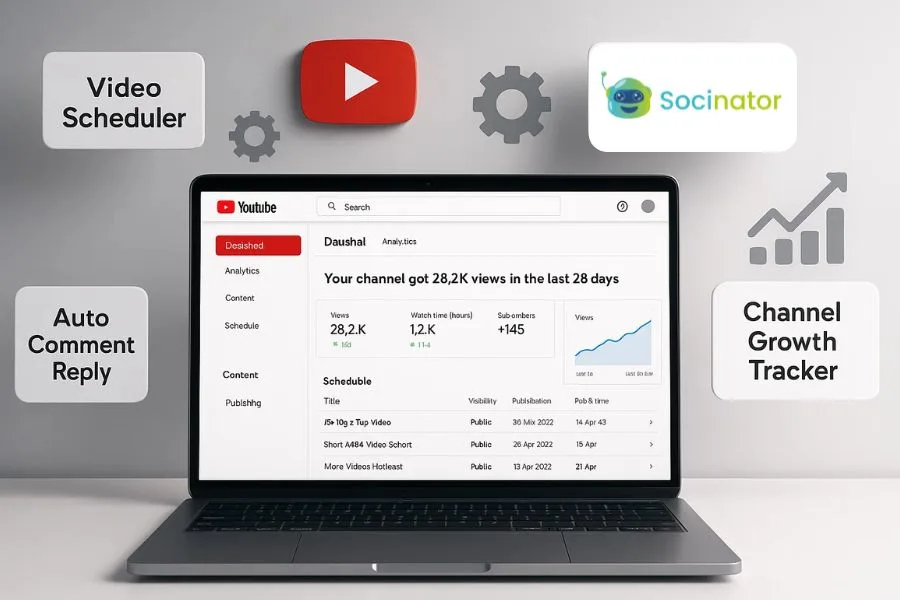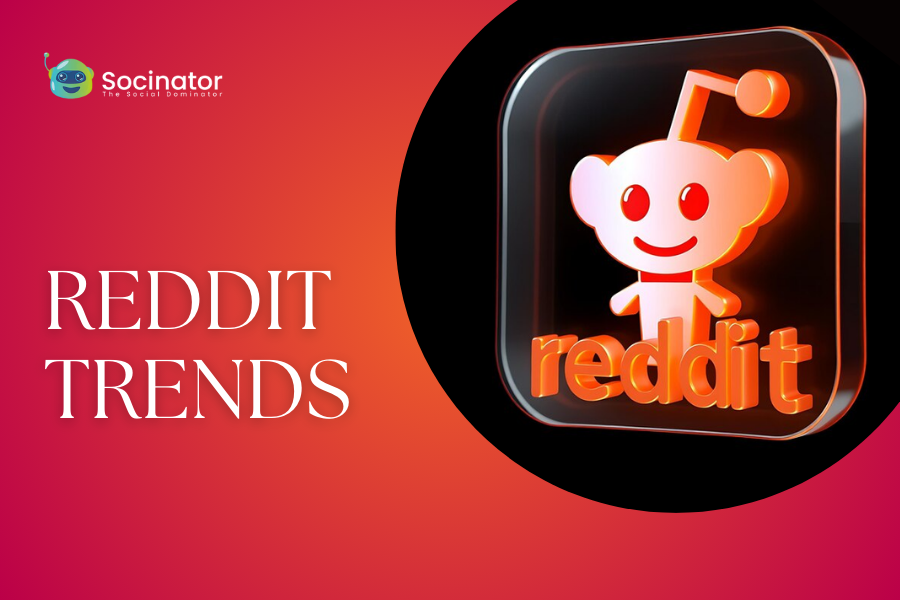Social media has evolved into an essential tool for businesses, brands, and individuals alike. Whether you’re aiming to promote your brand, engage with your audience, or drive traffic to your website, effective social media management is crucial.
However, mastering this art can be challenging due to the ever-evolving landscape of social media platforms and algorithms. The best way to manage social media amidst these complexities involves strategic planning, continual monitoring, and agile adaptation to emerging trends and algorithmic changes.
In this blog post, we will discuss social media management tips and its importance in how to manage social media accounts to grow them more efficiently.
Hit ‘Play’ Button & Tune Into The Blog!
Importance Of Social Media Management – Social Media Management Tips!
Social media management has become increasingly vital for individuals, businesses, and organizations in today’s digital landscape. Here are several reasons why it’s important:
Brand Visibility and Awareness:
Social media platforms have billions of active users worldwide. Managing your presence on these platforms helps increase your brand’s visibility and build awareness among your target audience.
Customer Service and Support:
Effective social media management ensures swift responses to inquiries and timely support, which are crucial for enhancing customer satisfaction and retention. Implementing social media management tips such as active monitoring, utilizing automation tools for streamlined responses, and maintaining a consistent brand voice can significantly improve the efficiency of managing social media interactions.
Content Distribution:
Social media news serves as a powerful channel for distributing content. By strategically sharing blog posts, videos, infographics, and other valuable content, you can reach a wider audience and drive traffic to your website or other online platforms.
Market Research and Insights:
Social media platforms offer valuable data and insights about your audience, competitors, and industry trends. Monitoring conversations, engagement metrics, and feedback provides valuable market research that can inform your strategies and decision-making.
Reputation Management:
Social media plays a significant role in shaping your brand’s reputation. Being proactive in management enables you to promptly address negative feedback or issues, mitigate potential crises, and uphold a positive brand image.
Lead Generation and Sales:
Social media platforms provide opportunities to generate leads and drive sales through targeted advertising, promotions, and lead generation campaigns. Effective social media management involves creating compelling content and leveraging advertising tools to convert followers into customers.
Community Building:
Social media fosters a sense of community around your brand. By fostering connections with your audience and facilitating conversations, you can cultivate a devoted community of brand advocates who organically promote your products or services.
Competitive Advantage:
Maintaining an effective social media presence can offer a significant advantage. Effective management allows you to differentiate your brand, stay ahead of competitors, and capitalize on emerging opportunities.
Adaptability and Agility:
Social media is constantly evolving, with new features, algorithms, and trends emerging regularly. Effective social media management requires adaptability and agility to stay abreast of changes, experiment with new strategies, and optimize performance accordingly.
Social media management is essential for building and maintaining a powerful online presence, fostering relationships with your audience, driving business objectives, and staying competitive in today’s digital landscape. Due to its importance, it is vital to focus on social media management tips to improve productivity.
Common Challenges In Social Media Management:
Social media management involves a wide array of tasks and responsibilities, each presenting its own set of challenges. Some common challenges include:
Content Creation:
Consistently generating engaging and relevant content can be challenging, especially with the pressure to stand out amidst the immense volume of content online.
Audience Engagement:
Encouraging meaningful interactions with your audience is crucial for building a loyal following. However, it can be challenging to stimulate engagement and maintain it over time.
Platform Algorithms:
Social media platforms frequently update their algorithms, affecting how content is prioritized and displayed. Adapting strategies accordingly to stay abreast of these changes can be demanding.
Measuring ROI:
Determining the ROI of social media efforts is often elusive. While metrics like likes, shares, and comments provide some insight, tying these to tangible business outcomes can be challenging. One of the crucial social media management tips is to constantly evaluate and refine your ROI measurement strategies
Managing Multiple Platforms:
Each social media platform has unique nuances and best practices. Juggling multiple platforms while maintaining a consistent brand voice and message can be overwhelming.
Negative Feedback and Crisis Management:
Resource Constraints:
Limited time, budget, and workforce can restrict the scope of social media activities. Prioritizing tasks and optimizing resources becomes essential.
Staying Relevant:
Social media trends evolve rapidly, and staying relevant requires constant monitoring and adaptation to new features, formats, and cultural shifts.
Competitive Landscape:
Competing for attention in crowded social media spaces can be challenging, particularly for small businesses or newcomers in the market.
Adapting to Changes in Policies and Regulations:
Social media platforms frequently update their policies and regulations, impacting advertising guidelines, content restrictions, and data privacy requirements. Staying compliant requires ongoing vigilance and adjustments to strategies.
Content Personalization:
Tailoring content to different audience segments and demographics while maintaining authenticity can be challenging.
Time Management:
Social media management can be time-consuming, from content creation and scheduling to community engagement and analytics review. Efficient time management is essential to avoid burnout and maintain productivity.
Combining creativity, adaptability, strategic planning, and leveraging analytics and automation tools can tackle these challenges. Moreover, focusing on social media management tips and fostering a culture of experimentation and continuous learning can help social media managers navigate the evolving landscape effectively.
Now, let’s explore actionable social media management tips to overcome these common hurdles
Social Media Management Tips To Save Time & Improve Productivity –
 Managing social media accounts can be time-consuming, but there are several strategies to streamline the process. These social media management tips can help you streamline your process and boost productivity:
Managing social media accounts can be time-consuming, but there are several strategies to streamline the process. These social media management tips can help you streamline your process and boost productivity:
Plan with a Content Calendar:
In the domain of social media management tips, a content calendar acts as your roadmap for success. It ensures a consistent posting schedule and helps you steer clear of the last-minute scramble for content ideas by planning strategically.
Batch Content Creation:
Instead of creating content on the fly, set aside dedicated time slots to create content in batches. This approach allows you to focus on one task at a time and can significantly increase efficiency. Whether it’s writing captions, designing graphics, or filming videos, batching your content creation process can save you time in the long run.
Repurpose Evergreen Content:
Make sure to use your best content wisely. Identify evergreen content that remains relevant over time and repurpose it across different platforms. Whether it’s updating blog posts for social media, turning infographics into slideshows, or transforming videos into GIFs, repurposing content can save you time while maximizing its impact.
Leverage Social Media Management Tools:
Invest in social media management tools like Socinator that enable you to work smarter, not harder. Whether it’s scheduling posts, analyzing performance metrics, or managing multiple accounts, tools like Socinator simplify your workflow and save you valuable time. Such tools also help you post to all social media at once without having to log into every platform individually.
Automate Routine Tasks:
Social media management tips like this one are around the corner nowadays, it includes utilizing automation tools like Socinator to streamline your social media management process. Schedule posts in advance, set up automatic responses to common queries, and use social listening tools to monitor mentions and keywords. Remember to balance automation with genuine engagement to maintain an authentic connection with your audience.
Curate Content from Trusted Sources:
You don’t have to create all your content from scratch. Curate relevant content from trusted sources within your industry and share it with your audience. Not only does this save you time on content creation, but it also positions you as a valuable resource for your followers.
Designate Specific Times for Engagement:
Rather than constantly checking social media throughout the day, set aside specific times to engage with your audience. Whether responding to comments, liking posts, or joining conversations, batching your engagement tasks can help you stay focused and productive.
Monitor Trends and Analytics:
Stay informed about social media trends and analyze your performance metrics regularly. By understanding what type of content resonates with your audience and adapting your strategy accordingly, you can optimize your efforts for maximum impact.
Delegate or Outsource Tasks:
If social media management feels overwhelming, consider delegating tasks to team members or outsourcing to freelancers or agencies. Whether it’s content creation, community management, or analytics tracking, sharing the workload can free up your time to focus on strategic initiatives.
By implementing these social media management tips, you can save time, improve productivity, and achieve better results with your social media efforts. Remember to stay flexible and adapt your strategy as needed to stay ahead in the ever-evolving world of social media.
Socinator For Managing Social Media – Social Media Management Tips:
Socinator is a social media management tool designed to automate and streamline various tasks across multiple social media platforms. Here’s how it can help in social media management:
Scheduling Posts:
Socinator allows users to schedule posts in advance across various social media platforms like Facebook, Twitter, Instagram, LinkedIn, Pinterest, etc. This feature allows for an automated posting schedule, eliminating the need for manual intervention.
Automated Engagement:
It enables automated engagement with your audience through features like auto-commenting, auto-liking, and auto-following/follow-back. It helps in increasing interaction and building a loyal follower base.
Content Curation:
It offers tools for discovering and curating content, simplifying the process of finding relevant and engaging content to share with your audience. It can also help in organizing and categorizing content for easy access.
Analytics and Reporting:
The platform offers insights into social media performance through analytics and reporting features. Users can track key metrics like engagement, reach, follower growth, etc., to measure the effectiveness of their social media strategies.
Audience Targeting:
Socinator allows users to target specific audiences based on demographics, interests, and behavior. It aids in reaching the appropriate audience with your content and social boosting engagement and conversions.
Campaign Management:
It facilitates the management of social media marketing campaigns by providing tools for campaign tracking, monitoring, and optimization. Users can track the performance of their campaigns in real time and make necessary adjustments for better results.
Account Management:
Socinator offers features for managing multiple social media accounts from a single analytics dashboard. It provides account verification, profile management, and security features to ensure seamless operation across multiple platforms.
Socinator streamlines various aspects of social media management, saving time and effort while maximizing the effectiveness of social media marketing efforts.
Also Read:
Social Media Management 101: Best Guide For Beginners
How To Master Social Media Customer Service
Why Does A Business Need a Social Media Manager?
Content Curation Secrets: The Ultimate Guide To Sharing High-Impact
A Complete Guide To Instagram Account Management For Creators
Conclusion –
In conclusion, mastering social media management is essential for individuals, businesses, and organizations seeking to thrive in today’s digital landscape. By implementing effective social media management tips, such as planning with a content calendar, leveraging automation tools like Socinator, and curating content from trusted sources, you can save time, improve productivity, and achieve better results with your social media efforts. Remember to stay flexible, monitor trends and analytics regularly, and adapt your strategy as needed to stay ahead of the competition. Social media management tips play a crucial role in navigating the complexities of the digital sphere and maximizing your impact!









